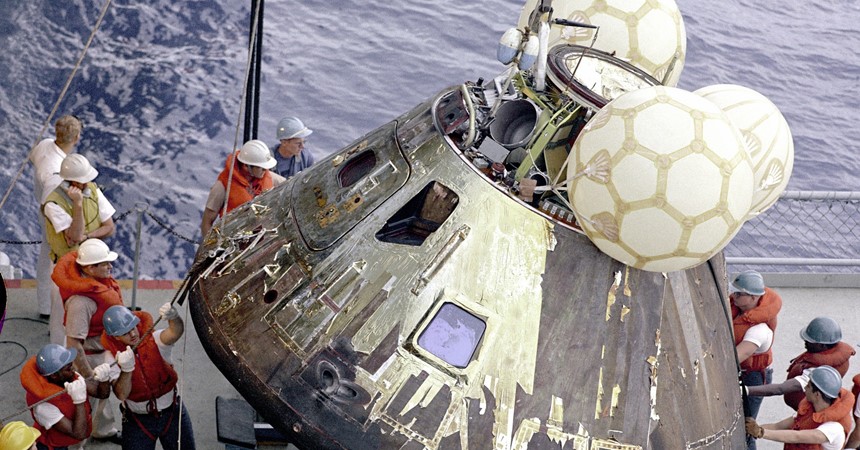One of my favourite movie lines is ‘Houston, we have a problem!’
You might recognise it from the movie about the real life and death situation of the Apollo 13 mission to the moon.
It’s an amazing story of how hundreds of people with diverse gifts and areas of expertise worked together to clutch life and triumph from the jaws of death and devastation. One person alone could not have saved the astronauts. Only everyone working together with what they had could do it. They had to let go of all their ‘if only’ thoughts. They had to acknowledge the shortcomings of the design of the two spaceships and literally make square pegs fit into round holes. And these hundreds of people who were fully, consciously and actively engaged in the work to save Apollo 13 were supported by a world united in hope and prayer that the astronauts would be saved.
There’s a lot in this story that can help us reflect on Church and on the liturgy which sustains our life and mission.
Pope Francis’ recent Apostolic Letter Desiderio Desideravi is addressed to all of us and is focused on ‘the liturgical formation of the People of God.’ It can be viewed on the Vatican website or downloaded here.
The letter could be imagined as a long ecclesial version of the statement, ‘Houston, we have a problem’.
The letter is motivated by desire. ‘I desire to reach you all …,’ to offer us some ‘prompts and cues’ for our reflection and contemplation of the liturgy which is a fundamental dimension of the life of the Church. (a.1)
Pope Francis invites us into a deep reflection on the liturgy and the Church. The liturgy is a gift given to us. God desires us to be there, to gather at the table of Word and Sacrament. The powerful beauty of the liturgy is that it is a place of encounter with Christ where we share in the power of his Paschal Mystery. (a. 6, 10, 11, 21, 24)
Christian faith is either an encounter with Him alive, or it does not exist. (a. 10)
In perfect continuity with the Incarnation, there is given to us in virtue of the presence and action of the Holy Spirit, the possibility of dying and rising in Christ. (a. 12)
The liturgy is not a cult or rite that exists in a separate one-hour-a-week box that we step out of once we leave the church building. Pope Francis invites us to look deeply, for the whole Church to know and experience the liturgy as a truth and power to be lived.
I want the beauty of the Christian celebration and its necessary consequences for the life of the Church not to be spoiled by a superficial and foreshortened understanding of its value …’ (a. 16)
He speaks of ‘astonishment’ and ‘wonder’. I find those words challenging when I reflect on my presence at and experience of the liturgy.
He talks about symbols and our capacity to engage them as doors to the sacred. Symbols are the language of the liturgy. Here is another challenge to consider.
Pope Francis’ reflection leads him to pose a series of key questions:
- How are we to recover the capacity to live completely the liturgical action? (a. 27)
- How do we continue to let ourselves be amazed at what happens in the celebration under our eyes? (a. 31 para 2)
- How can we become once again capable of symbols? How can we again know how to read them and be able to live them? (a. 45)
So … Houston we have a problem!
The response Pope Francis identifies is ‘the need for a serious and vital liturgical formation’ that includes all of us.
He invites us to reflect on this need, stating that his treatment of ‘the very rich theme of liturgical formation’ is not exhaustive, offering only some starting points.
To get us started he identifies two aspects that need to be distinguished: formation for the Liturgy and formation by the Liturgy, where the first depends on the second which is essential. (a. 34)
From all that we have said about the nature of the Liturgy it becomes clear that knowledge of the mystery of Christ, the decisive question for our lives, does not consist in a mental assimilation of some idea but in real existential engagement with his person. In this sense, Liturgy is not about “knowledge,” and its scope is not primarily pedagogical, even though it does have great pedagogical value. (Cf. Sacrosanctum Concilium, n. 33) Rather, Liturgy is about praise, about rendering thanks for the Passover of the Son whose power reaches our lives. The celebration concerns the reality of our being docile to the action of the Spirit who operates through it until Christ be formed in us. (Cf. Gal 4:19) The full extent of our formation is our conformation to Christ. I repeat: it does not have to do with an abstract mental process, but with becoming Him. This is the purpose for which the Spirit is given, whose action is always and only to confect the Body of Christ. (a 41)
The Pope goes on to reflect on the art of celebrating the liturgy, a most important consideration if we, the entire People of God, are to be formed by the liturgy. (a. 48ff) Pope Francis’ reflections continue to push us to go deeply, beyond the either/or dichotomies we see and experience, to the theological/God sense of the liturgy we celebrate together.
He is speaking about formation for everyone and specific liturgical ministers. As the letter draws to a close he says …
I would like this letter to help us to rekindle our wonder for the beauty of the truth of the Christian celebration, to remind us of the necessity of an authentic liturgical formation, and to recognize the importance of an art of celebrating that is at the service of the truth of the Paschal Mystery and of the participation of all of the baptized in it, each one according to his or her vocation.
… Christian life is a continual journey of growth. We are called to let ourselves be formed in joy and in communion. (a. 62)
The need for ongoing liturgical formation is the elephant in the room in most of our communities – parishes and schools alike.
At the moment several parish communities have expressed a desire for liturgical formation that will enliven the liturgy and therefore the life of their community. We live in an exciting moment and Pope Francis is pushing us to ‘abandon our polemics and listen to what the Spirit is saying to the Church.’ (a. 65 para 2.) You’d swear he has been at our Diocesan Synod and the Plenary Council!
It’s time for all of us to open our eyes and hearts to the need to engage in continuing formation. It’s a birth/baptism to death thing. As Pope Francis reflects, it is not the time for a naïve spiritualism that dismisses things as a ‘mystery’ beyond us. It is indeed always beyond us, and that’s why we are always in need of the liturgy and formation! And at the same time, it is a mystery we are called to incarnate in our daily lives and in the life, worship and mission of the Church. That’s huge and it requires that we understand what we are doing together and that we do it well.
Liturgy Matters often reflects on the importance of liturgical formation. You might like to revisit and think about the following:
Liturgy Matters: Really! lists a number of formation opportunities that are available.
Liturgy Matters: There’s an art to celebrating Liturgy offers a book review by Fr Andrew Doohan. The excellent and very readable book is available from the diocesan Resource Centre.
The next Australian Catholic University online public lecture is Monday 18 July. The lecture is titled ‘Celebrating Catholic Funerals …’ and will be delivered by Fr Paul Turner. Click on the link to register.
Mary Coloe pvbm is coming to this diocese for a reflection day titled ‘Rediscovering Joy: Finding wonder and joy on the Word of God.’ Read more from Mary on her website.
The Christian Initiation Australia Network (CIAN) is offering a Webinar titled Ways to get your parish involved in your RCIA Process. For more information and registration click here. It is also worth visiting the CIAN website.
Garrat Publishing in association with ACU is offering a free short online course on ‘Gospels for the Liturgical Year.’ For all details and registration click here.
I invite you to read Pope Francis’ relatively short Apostolic Letter and see what ‘prompts and cues’ your reflections. You might gather and share our reflections. Don’t wait for someone to invite you: You do it. As Pope Francis makes very clear, the liturgy belongs to all of us, and all of us are called to live it every day.
For the liturgy to become all it is meant to be for our life, it will take all of us, letting go of our ‘if only’s’, working with what we’ve got to fit square pegs into round holes and to be united in hope and prayer.
It is time to choose life not death! Let’s get everyone safely home!
Acknowledgements
Image: Apollo 13 Landing Module. WikiImages from Pixabay
Quotations from Deriderio Desideravai. © 2022 Dicastero per la Comunicazione – Libreria Editrice Vaticana. All rights reserved.

